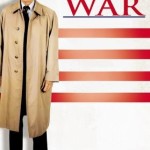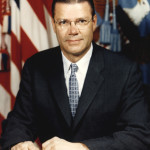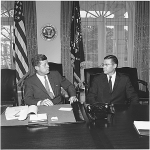WoW- we unearthed this archived Words on Wednesdays. Who knew a post on a book by a military leader on death, decisions and war’s ravages would be an ‘evergreen’ item as marketers call an always relevant or in demand product?
Now… back to the future in this encore post…..
I was in my own operational fog, the day I pulled “The Fog of War” a multi award winning film by documentarian, Errol Morris from the library shelf. At that moment, I lacked the clarity of Robert Strange McNamara, the sole focus of the 100 and something minute film. Of course, he was talking with perspective of a lifetime further distilled from 20 hours of interviews with him. And I didn’t have an 11 lesson framework on which the Former Secretary of Defense Robert S. McNamara based his recollections and comments.
 Critics have dubbed this film, the 11 excuses of McNamara. Others have said this film is evidence of his wandering the earth looking for redemption, for doing too little too late in relation to the Vietnam War. This must surely be part of the fallout from the Fog of War, where military operations which depend heavily on communications and intelligence to be successful, yet can be compromised when any elements fail. Confusion can occur. From that, miscalculation in strategic tactics and the ultimate price paid by individual service members in combat situations, including friendly fire fatalities.
Critics have dubbed this film, the 11 excuses of McNamara. Others have said this film is evidence of his wandering the earth looking for redemption, for doing too little too late in relation to the Vietnam War. This must surely be part of the fallout from the Fog of War, where military operations which depend heavily on communications and intelligence to be successful, yet can be compromised when any elements fail. Confusion can occur. From that, miscalculation in strategic tactics and the ultimate price paid by individual service members in combat situations, including friendly fire fatalities.
Of course, there’s also the paper part of the fog of war. The political version, in which misinformation or facts are reported ambiguously to influence opinions.
At 85, he had perspective. He could talk to us all about his life and actions.
“I’m at an age where I CAN look back and derive some conclusions about my actions. My rule has been: try to learn, try to understand what happened, develop the lessons and pass them on,” says McNamara at the start of the film.
You should know that the bookshelf from which the film Fog of War leapt onto me has magical qualities. It often delivers the exact topics and the messengers I need to understand not only my world but that of the readers I serve or the communication requirements of the clients I work for.
This film had a big impact on me, and I have since recommended it to colleagues currently serving in the military. Why the impact? I came of age during McNamara’s tenure as the 8th Secretary of Defense. The Vietnam War came into my Canadian living room via newscasts. My world had flowers in it and peace symbols although I was not of the age or upbringing to ever become a full fledged hippie.
I appreciated this film to help me understand the tumult of the world I came into as a teen. And then to understand the magnitude of the events that had swirled around me and dictated many of my cultural and career choices. No wonder I gravitated to the field of communication in all its subtle and powerful forms. It was a natural outcome of the information saturated world I was born into and McNamara was one of the men who was “thinking the unthinkable” and handing it down as a legacy to my generation.
As McNamara says in the film, “We have the soft message and we have the hard messages.”
In this particular quote he speaks of the choices America had in replying to Khrushchev to avert an irreparable global disaster. He speaks directly about nuclear war. You’ll need to view the full documentary to glean all the details, but below this personal recommendation, you’ll find an excellent summary source in a power point presentation, online.
The film is riveting and real. Our guide is a man who served 3 years in the US Army during WW2, 7 years as Secretary of Defense during the Vietnam War and 13 years at the World Bank, working all over the world. Interspersed with his close up interviews are priceless photos and video clips that relay volumes of historical fact and the feeling, at a glance.
In this portrait of a man and military member are snippets of McNamara’s childhood upbringing, his education at Berkeley and Harvard. It may become clear to viewers why some have called him “an IBM machine with legs.” And how he asserted civilian control over the military in his day and is said to be the first to do so.
The Fog of War intercuts McNamara’s recollections of invasions and of policy and diplomacy with video of historic moments, some of which shed light on:
The logic of war.
The conditions of mutual annihilation.
Critical communication between individuals and cultures.
The dangers that exist today.
Our lives and actions could not have been different. What McNamara and I, and you dear reader, have in common, very critically in common, is the need to learn more. As the civilian co-founder of this site, I rely on various media including books, audio and film works to help me learn about the military and veteran experience I feel compelled to be involved in. It’s just the backgrounder though to the privilege of reading and posting the individual stories of our guest writers and readers.
McNamara fulfills both roles in this film. He is a veteran himself and his transition to corporate life and beyond to advising America’s Commanders in Chief is worthy of being heard, understood and acknowledged. (HUA!)
“We must try to put ourselves inside their skin, and to look at us through their eyes, just to understand their thoughts that lie between their decisions and their actions. That’s called empathy,” says McNamara at one of the many poignant moments of the film.
“Any military commander, who is honest with himself, will admit that he has made mistakes in the application of military power. He’s killed people. His own troops and others, some unnecessarily. Tens, hundreds, thousands even, but he hasn’t destroyed nations.
There’ll be no learning periods with Nuclear weapons…. You make one mistake and you can destroy nations.
There is much to be learned.”
And now, to the summary of the lessons and quotations to illustrate them, taken from the documentary material, in Robert McNamara’s own words……
Lesson 1: Empathize with your enemy:
“Let me go back one moment. In the Cuban Missile Crisis, at the end, I think we did put ourselves in the skin of the Soviets. In the case of Vietnam, we didn’t know them well enough to empathize. And there was total misunderstanding as a result. They believed that we had simply replaced the French as a colonial power, and we were seeking to subject South and North Vietnam to our colonial interests, which was absolutely absurd. And we, we saw Vietnam as an element of the Cold War. Not what they saw it as: a civil war.”
Lesson 2: Rationality will not save us:
“I want to say, and this is very important: at the end we lucked out. It was luck that prevented nuclear war. We came that close to nuclear war at the end. Rational individuals: Kennedy was rational; Khrushchev was rational; Castro was rational. Rational individuals came that close to total destruction of their societies. And that danger exists today.”
Lesson 3: There is something beyond one’s self:
“Brains are like hearts – they go where they are appreciated”
Lesson 4: Maximize efficiency:
Maximize efficiency “I analyzed bombing operations, and how to make them more efficient. i.e. Not more efficient in the sense of killing more, but more efficient in weakening the adversary. I wrote one report analyzing the efficiency of the B—29 operations. The B—29 could get above the fighter aircraft and above the air defense, so the loss rate would be much less. The problem was the accuracy was also much less. Now I don’t want to suggest that it was my report that led to, I’ll call it, the firebombing. It isn’t that I’m trying to absolve myself of blame. I don’t want to suggest that it was I who put in LeMay’s mind that his operations were totally inefficient and had to be drastically changed. But, anyhow, that’s what he did. He took the B—29s down to 5,000 feet and he decided to bomb with firebombs.”
Lesson 5: Proportionality should be a Guideline in War:
“Proportionality should be a guideline in war. Killing 50% to 90% of the people of 67 Japanese cities and then bombing them with two nuclear bombs is not proportional, in the minds of some people, to the objectives we were trying to achieve.”
Lesson 6: Get the Data:
“Our judgment, our understanding, is not adequate. And we kill people unnecessarily.”
Lesson 7: Belief and Seeing are often wrong:
“There’s a wonderful phrase: ‘the fog of war.’ What “the fog of war” means is: war is so complex it’s beyond the ability of the human mind to comprehend all the variables.”
Lesson 8: Be prepared to re-examine your reasoning:
“Neither conscience nor sanity itself suggests that the United States is, should or could be the global gendarme.” “Coercion, after all, merely captures man. Freedom captivates him.”
Lesson 9: In order to do good, you may have to engage in evil:
“Norman Morrison was a Quaker. He was opposed to war, the violence of war, the killing. He came to the Pentagon, doused himself with gasoline. Burned himself to death below my office. He held a child in his arms, his daughter. Passersby shouted, “Save the child!” He threw the child out of his arms, and the child lived and is alive today. His wife issued a very moving statement: ‘Human beings must stop killing other human beings.’ And that’s a belief that I shared. I shared it then and I believe it even more strongly today. How much evil must we do in order to do good? We have certain ideals, certain responsibilities. Recognize that at times you will have to engage in evil, but minimize it.”
Lesson 10: Never say never:
“Never say never. Secondly, never answer the question that is asked of you. Answer the question that you wish had been asked of you.”
Lesson 11: You can’t change Human Nature:
“I’m not so naive or simplistic to believe we can eliminate war. We’re not going to change human nature anytime soon. It isn’t that we aren’t rational. We are rational. But reason has limits.”
………………….Robert McNamara
Helena Kaufman is co-founder of Military Success Network. She is an editor and writer now based in Vancouver, Canada and fascinated with change. Let’s call it obsessed and living her own real life experiment in transition. Even in the corporate battle theatre, she strives to carry out the MilSuccessNet “HUA” mission – To help men and women be Heard, be Understood and therefore be Acknowledged in the marketplace and in their personal spheres by defining and then writing their professional profile or story.



Excellent post. I absolutely love this site. Continue the good work!